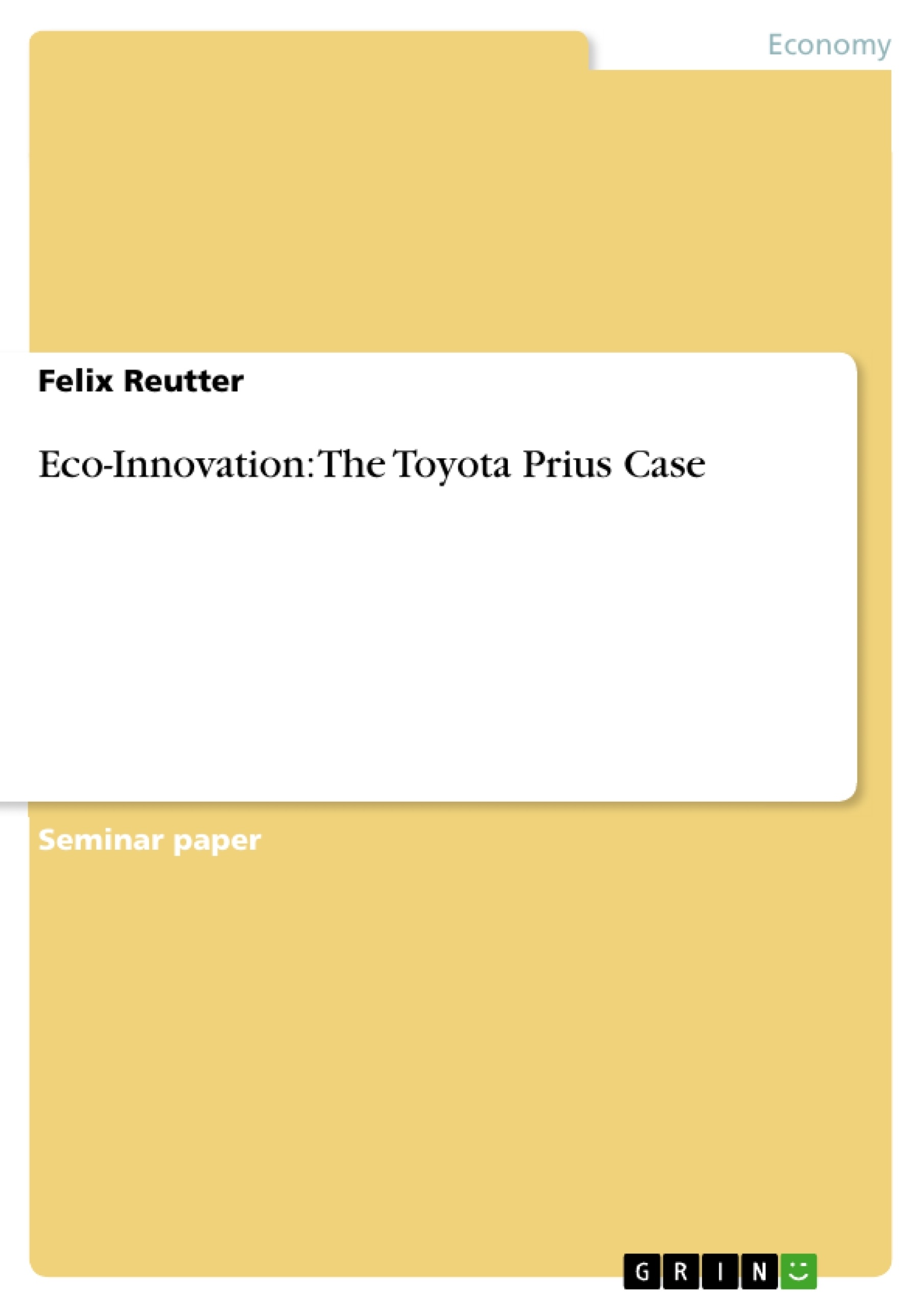The aim of this paper is to argue why the Toyota Prius can be classified as product eco-innovation and to study why the eco-innovation Toyota Prius has been successful. For this purpose the general literature on eco-innovation is reviewed and applied on the specific case of the Prius.
The paper is organized as follows: section 2.1 provides a brief overview of the different definitions of the term eco-innovation that are proposed in the literature. Next, section 2.2 depicts the factors determining the success of an eco-innovation which are named in the eco-innovation literature. After this, section 3 introduces the case of the Toyota Prius and argues why the Prius can be classified as product eco-innovation. Then, section 4 studies which determinants of eco-innovation have contributed to the success of the Prius. Finally, section 5 summarizes the findings of this paper and evaluates them critically.
Inhaltsverzeichnis (Table of Contents)
- Introduction: Topic, research questions, methodology, and structure of the paper
- Eco-innovation: Theoretical background
- Definitions of the term eco-innovation
- Determinants of eco-innovation
- The Toyota Prius as product eco-innovation
- Determinants for the success of the eco-innovation Prius
- Technology push
- Market pull
- Regulatory push and/or pull
Zielsetzung und Themenschwerpunkte (Objectives and Key Themes)
This paper aims to establish the Toyota Prius as a product eco-innovation and investigate the contributing factors to its success. It reviews existing literature on eco-innovation and applies it to the specific case study of the Prius, analyzing data from various studies on hybrid vehicles, Toyota, and the Prius.
- Defining and classifying eco-innovations
- Identifying determinants of eco-innovation success
- Analyzing the technology push, market pull, and regulatory push/pull influencing the Prius
- Exploring the role of consumer motivations in Prius adoption
- Evaluating the importance of specific government policies in the Prius’s diffusion
Zusammenfassung der Kapitel (Chapter Summaries)
- Introduction: Topic, research questions, methodology, and structure of the paper: This chapter introduces the paper’s objective, which is to classify the Toyota Prius as a product eco-innovation and explore its success factors. It outlines the research questions, methodology, and the structure of the paper, guiding the reader through the subsequent sections.
- Eco-innovation: Theoretical background: This chapter delves into the definition of eco-innovation, reviewing various perspectives from the literature. It presents three key definitions, including those by Rennings, the ECODRIVE project, and the European Commission. Additionally, it explores the theoretical determinants of eco-innovation success, focusing on technology push, market pull, and regulatory push/pull.
- The Toyota Prius as product eco-innovation: This chapter introduces the Toyota Prius case, detailing its development by the Toyota Motor Corporation (TMC). It discusses the Prius’s environmental benefits, including its fuel efficiency and reduced emissions compared to conventional cars. Furthermore, it classifies the Prius as a product eco-innovation based on the established definitions.
- Determinants for the success of the eco-innovation Prius: This chapter delves into the factors contributing to the Prius’s success, analyzing the technology push, market pull, and regulatory push/pull. It examines the specific circumstances that drove Toyota’s development of the Prius and the consumer motivations behind its adoption. This chapter also explores the influence of government policies, particularly in Japan and the United States, on the innovation and diffusion of the Prius.
Schlüsselwörter (Keywords)
This paper focuses on key concepts related to eco-innovation, including its definition, determinants, and case studies. It explores technology push, market pull, and regulatory push/pull as drivers of innovation success. The paper also analyzes the role of consumer motivations, including environmental concerns, financial benefits, and social norms, in the adoption of eco-friendly technologies like the Toyota Prius. The research centers around the Prius case study, examining its development, diffusion, and policy influences.
- Quote paper
- Felix Reutter (Author), 2013, Eco-Innovation: The Toyota Prius Case, Munich, GRIN Verlag, https://www.hausarbeiten.de/document/264459



